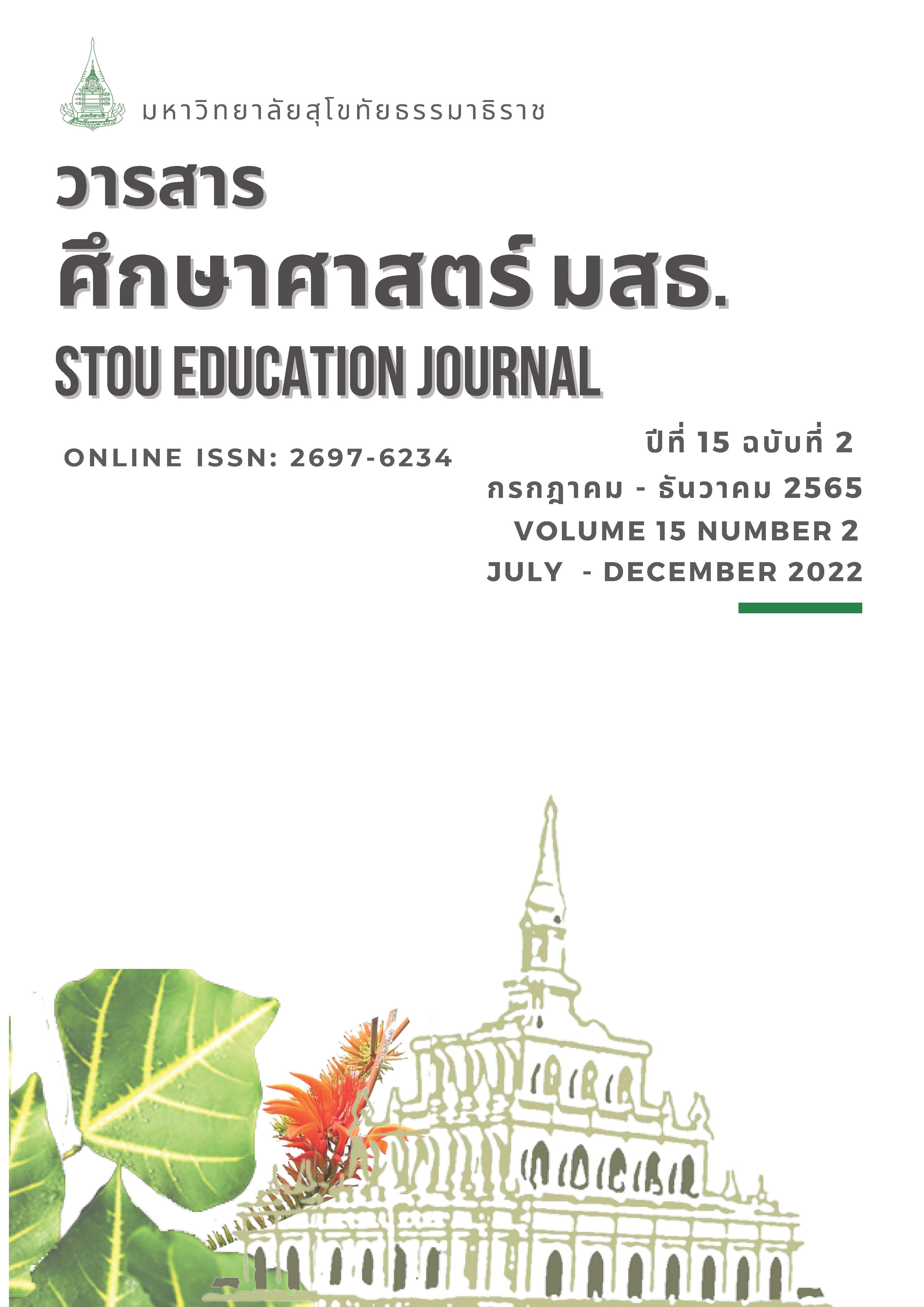Factors Predicting Graduation of Graduates, Bachelor of Education Program, School of Educational Studies, Sukhothai Thammatirat Open University
Main Article Content
Abstract
The objectives of this research were to study (1) factors predicting graduation for the students of the Bachelor of Education Program, School of Educational Studies (SES), Sukhothai Thammathirat Open University (STOU), and (2) guidelines for promotion of the graduation for students in the Bachelor of Education Program, School of Educational Studies, Sukhothai Thammathirat Open University. The key informants were 290 students who had graduated from the Bachelor of Education Program of SES, STOU, and 10 experts on instruction in the distance education system. The research instruments were a questionnaire on factors affecting the graduation, and a questionnaire on guidelines for promotion of undergraduate students to graduate Log-rank test, Kaplan Meier analysis, and Cox regression survival analysis were used for analyzing quantitative data and content analysis for the qualitative data. The findings were as follows: (1) the survival analysis showed none of the factors in this study that could fit the proposed survival function model and hence, no factor was found to be able to predict the graduation of the undergraduate students in the study; by the way, when conducting the survival analysis, two variables were found to have significant hazard ratios values, within the required study time, at p > .01, namely, the majoring in Educational Measurement and Evaluation and the required minimum study time of the program; and (2) guidelines to be initiated, for the university, in promoting the graduation of the undergraduate students of Bachelor of Education Program were as follows: publicizing timely, promptly and through multiple channels, the information on programs and learning methods; the having of clear guidelines on management of instructional activities; the provision of an academic advisor for each student; the provision of appropriate and up-to-date study programs and course contents; and the assignment of supplementary activities for the students to work on their own.
Article Details
References
มหาวิทยาลัยรามคำแหง. (2556). ปัจจัยที่มีผลต่อความสำเร็จการศึกษาระดับปริญญาตรีของนักศึกษามหาวิทยาลัยรามคำแหง สาขาวิทยบริการเฉลิมพระเกียรติ จังหวัดนครศรีธรรมราช (รายงานผลการวิจัย). มหาวิทยาลัยรามคำแหง.
ลลิดา สาสาย. (2550). ปัจจัยที่ส่งผลต่อการสําเร็จการศึกษาของนักศึกษาระดับปริญญาตรี มหาวิทยาลัยสุโขทัยธรรมาธิราช [วิทยานิพนธ์ปริญญามหาบัณฑิต, มหาวิทยาลัยศรีนครินทรวิโรฒ]. The Central Library of Srinakharinwirot University. http://thesis.swu.ac.th/swuthesis/Ed_Mea/Lalida_S.pdf
วิจิตรา สุพรรณฝ่าย. (2555). การศึกษาปัจจัยที่ทํานายการสำเร็จการศึกษาของนักศึกษาระดับปริญญาโท สาขาวิชาศึกษาศาสตร์ มหาวิทยาลัยสุโขทัยธรรมาธิราช [วิทยานิพนธ์ปริญญามหาบัณฑิต ไม่ได้ตีพิมพ์]. มหาวิทยาลัยสุโขทัยธรรมาธิราช.
สำนักทะเบียนและวัดผล. (2561). ข้อมูลการรับนักศึกษาใหม่และการสำเร็จการศึกษา ศึกษาศาสตรบัณฑิตระหว่างปี 2555-2560. มหาวิทยาลัยสุโขทัยธรรมาธิราช.
สำนักวิชาการ. (2553). หลักสูตรการศึกษาสาขาวิชาศึกษาศาสตร์. โรงพิมพ์มหาวิทยาลัยสุโขทัยธรรมาธิราช.
สมศักดิ์ มีทรัพย์หลาก. (2541). ปัจจัยที่มีผลต่อความสำเร็จในการศึกษาระดับปริญญาตรีของมหาวิทยาลัยเปิดที่ใช้ระบบการศึกษาทางไกล: กรณีศึกษามหาวิทยาลัยสุโขทัยธรรมาธิราช [วิทยานิพนธ์ปริญญาดุษฎีบัณฑิต, สถาบันบัณฑิตพัฒนบริหารศาสตร์]. NIDA Wisdom Repository. http://repository.nida.ac.th/handle/662723737/923
Gachugi, J. (2013). Factors influencing completion of bachelor of education distance learners at Kenya Methodists university: A case of Nyeri municipality. Department of Distance Studies University of Nairobi.
Kember, D. (1995). Open learning courses for adults: A model of student progress. Educational Technology Publications.
Schoenfeld, D. A. (1983). Sample-size formula for the Proportional-Hazards Regression Model. Biometrics, 39(2), 499–503. https://doi.org/10.2307/2531021


